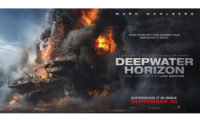Deepwater Horizon the film – A review

Hollywood spent $110 million on this film, which isn’t unusual for a disaster pic. But this film, directed by Peter Berg (“Friday Night Lights,” “Lone Survivor”) and starring Mark Wahlberg, is different. The disaster, a spectacular exercise in film-making involving literally hundreds of special effects and digital artists, is secondary in the plot to the muddy, nuts-and-bolts work of a very dangerous blue collar environment.
Deepwater Horizon is filmed almost as a docu-drama focusing on the rig workers, their families, supervisor pressures and “upper management” decision-making. I have a hard time believing producers and studios placed their bets on this movie returning a profit. That’s because 1) working class characters are totally out of sync with Hollywood’s preoccupation with comic book heroes; and 2) the film is actually quite technical in its focus on the specifics of deep water well drilling.
It’s also difficult to draw an audience to a film when everyone already knows the ending. But one of the reasons to go see Deepwater Horizon is its realism. The film uses “real” rig workers and U.S. Coast Guard personnel as actors. The dialog on the rig is sometimes technical, sometimes profane, and in conversations and arguments characters talk over each other in overlapping dialog, just like we do in “real life.” There’s a lot of hand-held camera work following workers around the rig, and tight close ups of workers, supers and managers.
The scene where BP managers host a safety celebration below deck complete with ice cream for the crew and the BP guys drag a reluctant supervisor to hold the safety award while they mug for corporate photos is on the money, and I must say the first time I’ve ever seen a big budget (or small budget) Hollywood movie depict a safety awards presentation.
It’s a Hollywood tradition to make corporations almost de facto “bad guys.” Greedy. Corrupt. Ruthless. I was surprised by the small amount of “BP bashing” in the film, though I imagine BP begs to differ. Decisions made that day (the project is 40+ days behind schedule, the pressure is on, tests are neglected or the results excused away) take a back seat in terms of screen time to the broader theme of studying how workers act and think in a crisis situation.
At the film’s end, each of the 11 workers who died in the explosion is shown in still photos taken from family collections, I imagine. With their kids, smiling, laughing. They could be any of us. When the film premiered, Walhberg and the other actors didn’t walk the traditional red carpet. The carpet was black.
Deepwater Horizon is a gritty, sometimes scary, always down to earth, almost minimalist picture. It’s tight focus is on the workers. And it honors the dignity of hard, dangerous work as well as anything I’ve seen the studios produce. Go see it.
Looking for a reprint of this article?
From high-res PDFs to custom plaques, order your copy today!






